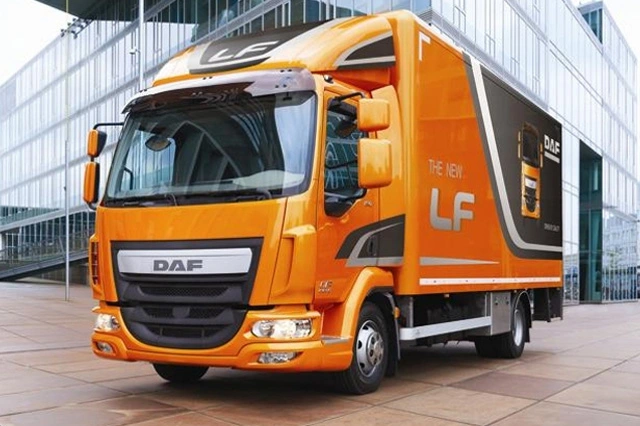What is HGV Insurance?
HGV (heavy goods vehicle) insurance, also known as haulage insurance, is designed for commercial use vehicles over 7.5 tonnes.
An insurance policy for this type of vehicle will usually cover the cab and driver, carried goods, and the trailer itself. These insurance covers can include commercial motor insurance and goods-in-transit insurance, tailored to specific needs. There are other features that can also be added to these policies as further protections for the driver or business.
Drivers covering the UK won’t always need international insurance, so HGV insurance has some flexibility in its coverage. Insurance cover can be UK only, UK and Europe or International for long-distance haulage.
How our process works
We’ve worked hard to refine our process and keep it as quick, easy and simple as possible for our customers.
Do I Need HGV Truck Insurance?
If you’re transporting goods, it’s incredibly important to have motor insurance, no matter the distance you’re covering. Even if you aren’t driving the lorry, it will legally need to have insurance or need an off-road notice (or SORN).
HGVs can be individually insured or can be insured as part of a fleet policy managed by a business.
What Does HGV Insurance Cover?
HGV insurance in the UK is very similar to domestic car insurance in that there are different levels of insurance to consider.
- TPO (Third-Party Only): This insures the third party in the result of an accident where you are at fault.
- TPFT (Third Party, Fire, and Theft): This is the same as above but also covers you for fire and theft of your lorry.
- Comprehensive Insurance: This insures and cover you and the third party.
- Telematics Truck Insurance (Requiring a Black Box): This is often the most cost effective way to insure your vehicle providing real time data.
Of course, the size and value of goods in the vehicles can make these policies slightly more complex and any specialist use can mean that some of these aren’t an option.
What Does Insurance For HGV Drivers Include?
It’s fairly likely that your HGV is being used for business purposes or the transport of goods, but the specifics of this can impact the insurance available to you.
HGV Insurance Policy Features
The insurance policy for your lorry or HGV fleet can be tailored to include a number of additional features.
Truck Insurance Cover Options
Truck insurance cover options vary depending on the provider and the specific needs of the driver or fleet. Here are some common cover options to consider:
- Comprehensive Cover: This is the highest level of truck insurance cover, providing protection against damage to your vehicle as well as third-party liability. It ensures that both your truck and any third-party property are covered in the event of an accident.
- Third-Party Fire and Theft: This level of cover offers protection against damage to third-party property, as well as fire and theft of your vehicle. It’s a step up from the basic third-party only cover, giving you added peace of mind.
- Third-Party Only: This is the minimum level of cover required by law. It provides protection against damage to third-party property only, meaning any damage to your own vehicle will not be covered.
- Employers Liability Insurance: This type of insurance is crucial for employers, providing protection in case of accidents or injuries to employees while on the job. It’s a legal requirement for businesses with employees.
- Public Liability Insurance: Public liability insurance offers protection for drivers in case of accidents or injuries to third parties while on the job. This cover is essential for safeguarding against claims made by the public.
By understanding these truck insurance cover options, you can choose the right level of protection for your specific needs, ensuring you are adequately covered on the road.
Telematics HGV Insurance
Telematics HGV insurance is a modern approach to truck insurance that uses technology to track the driver’s behaviour and calculate premiums based on their driving habits. This type of insurance can be particularly beneficial for safe and responsible drivers, as it often leads to lower premiums. Here are some key benefits of telematics HGV insurance:
- Lower Premiums for Safe Drivers: By monitoring driving habits, insurance providers can offer lower premiums to drivers who demonstrate safe driving behaviours. This can result in significant cost savings over time.
- Improved Driving Habits: Telematics provides real-time feedback on driving behaviour, helping drivers to improve their habits and become safer on the road. This not only reduces the risk of accidents but also contributes to overall road safety.
- Increased Safety on the Road: With telematics, drivers are more aware of their driving patterns and are encouraged to drive more cautiously. This leads to a safer driving environment for everyone on the road.
- Ability to Track Vehicle Location and Driving Habits: Telematics systems allow for the tracking of vehicle location and driving habits, providing valuable data that can be used for various purposes, including route optimization and fleet management.
By opting for telematics HGV insurance, drivers and fleet managers can benefit from lower premiums, improved safety, and valuable insights into driving behaviour.
HGV Insurance Claims
Making a claim on an HGV insurance policy can be a complex process, but following the correct procedures can ensure a smooth and efficient claims experience. Here are the steps to follow:
- Notify the Insurance Provider: As soon as an accident or incident occurs, notify your insurance provider immediately. Prompt notification is crucial for a timely claims process.
- Provide Detailed Information: Gather and provide detailed information about the incident, including photos, witness statements, and any other relevant documentation. This information will help support your claim.
- Complete a Claims Form: Fill out the claims form provided by your insurance provider and submit it along with the necessary documentation. Ensure all information is accurate and complete.
- Cooperate with the Investigation: Your insurance provider may conduct an investigation into the incident. Cooperate fully and provide any additional information or documentation requested.
- Keep Records: Maintain records of all correspondence and communication with your insurance provider. This includes emails, letters, and phone calls. Keeping detailed records can help resolve any issues that may arise during the claims process.
By following these steps, you can navigate the HGV insurance claims process with confidence and ensure a fair resolution.
Choosing the Right HGV Insurance Provider
Selecting the right HGV insurance provider is crucial for ensuring you get the best coverage and service. Here are some factors to consider when making your decision:
- Reputation: Look for an insurance provider with a strong reputation and high levels of customer satisfaction. Reading reviews and testimonials can give you insight into the experiences of other customers.
- Coverage Options: Consider the types of coverage options available and whether they meet your specific needs. A provider that offers a range of options can help you tailor your policy to your requirements.
- Premiums: Compare premiums from different providers to ensure you’re getting the best value for your money. Keep in mind that the cheapest option may not always provide the best coverage.
- Claims Process: Evaluate the claims process of each provider. A straightforward and efficient claims process can make a significant difference in the event of an accident or incident.
- Customer Service: Good customer service is essential. Look for a provider with a responsive and helpful customer service team that can assist you with any questions or issues.
By considering these factors, you can choose an HGV insurance provider that offers the right balance of coverage, cost, and service.
What Are The Requirements Of Your HGV Insurance Quote?
Before applying for lorry insurance, there are a few details that you’re going to need to make sure you’re fully covered and that your policy details are accurate.
What is the value of your Truck?
As with any type of insurance policy, you will need to know the value of the thing that you’re insuring. For HGVs, this essentially means ‘how much would my HGV be worth if I sold it?’ This helps to put a value on it in the case of an accident or in the instance that the vehicle is written off.
It’s really important that you don’t undervalue your vehicle as you may lose out on a pay-out reflecting its true value should an accident occur. Reducing an estimate by two or three thousand to reduce a quote isn’t worth the thousands you could lose out on should an accident actually happen.
What is the age of your vehicle?
The age of your vehicle will contribute to the final cost of your insurance, with newer models typically being less expensive than older HGVs. Newer models are less likely to break down and repair and vehicle retrieval can be considerably less. This might not be the case if your insurance policy is international though – long-distance retrievals can be very expensive.
What will you carry using your HGV?
This again goes back to the types of goods you will be transporting and where insurance priorities lie with cargo and goods on board. Lower-value goods will, of course, be cheaper to insure in most cases. A single HGV full of gravel, for example, will be cheaper to insure than one full of oil.
For some drivers, the type of goods carried can change regularly but it’s important to be covered for those higher amounts and it’s well worth altering a policy rather than losing out should something go wrong.
Where will you be transporting goods to and from?
Spend some time considering your possible delivery destinations. For some industries, most travel will be done within the UK, whilst others may lead the driver further afield. Food delivery, for example, will likely lead to driving within Europe.
Risks involved in these locations can mean that adding European insurance to a UK-only policy can impact the price. Even with the added premium, it’s essential that this policy information is accurate or you risk not being covered.
HGV Insurance For New Drivers
New HGV drivers may be limited in the policies that they can choose and may see some premiums rise with fewer years behind the wheel. Adding a new driver to a fleet policy rather than an individual policy may be one option, but it’s a good idea to compare HGV insurance options and see which are most suitable (and most reasonably priced) for you.
Can You Get HGV Insurance For Young Drivers?
It can be difficult for young drivers to get insurance on a car, never mind an HGV, so it’s no real surprise that this is an incredibly common question for insurers. Lots of policies on the market that will only insure HGV drivers over the age of 25. For some businesses, this can present a challenge. For these cases, it can be really beneficial to speak to someone for advice.
Save Money On Your HGV Insurance
There are plenty of HGV insurance brokers out there but how can you know which of these brokers is offering you everything you need and offering you a great, affordable deal on your HGV insurance? The trick is to compare the options available to you.
How Much Does HGV Insurance Cost?
There are lots of different factors that impact the truck insurance cost of an insurance policy. The vehicle age and type, goods transported, and the experience of the driver are just a couple of things that can make a huge difference.
So, how do I reduce the cost of my HGV insurance?
You can try to save on your HGV insurance in a few ways.
- Employ drivers that are experienced and have clean licences.
- Be aware of driver age and how this impacts premiums. (Many insurers will not insure young HGV drivers under the age of 25).
- If you manage multiple heavy goods vehicles, look into fleet policies for better rates.
- Pay annually rather than monthly where business capital allows it.
- Use black boxes or cameras to determine liability should an accident occur.
- Ensure there is a safe location for the HGV to be stored overnight.
- Make sure the vehicle has any security devices appropriate for its use.
- Avoid modifications to vehicles where they will make policies more complicated and increase insurance premiums.
- Don’t over-insure. If you won’t ever be travelling abroad, don’t get international insurance cover.
Do I Need Insurance For My HGV?
Yes, it is required by law for everybody who drives any kind of vehicle on UK roads to have insurance. You are not required by law to have insurance for the products you transport in a truck like an HGV, but most businesses will only hire you if you do and it removes lots of potential risk for the driver or business.
It is risky to transport products across the UK, Europe, or even worldwide, thus it is advisable to insure all aspects of the shipment, not just the lorry.
Frequently Asked Questions
Related News
The Benefits of Using Premium Fuel Over Regular Fuel
In the UK, motorists are presented with a variety of choices when it comes to fuelling their vehicles, with premium fuels being a common option. While standard fuel may appear more cost-effective at first
The Latest 7.5 Tonne Lorry Review
The 7.5-tonne lorry is a popular choice for businesses and logistics operations due to its balance between payload capacity, manoeuvrability, efficiency and better lorry insurance costs. In the UK, several manufacturers offer models within
Guide to Operators Licence for HGVs in the UK
The needing or not needing of an operators licence for a HGV is often a confused issue. Here we look to debunk some of the misinformation around the requirement for an operators licence.





